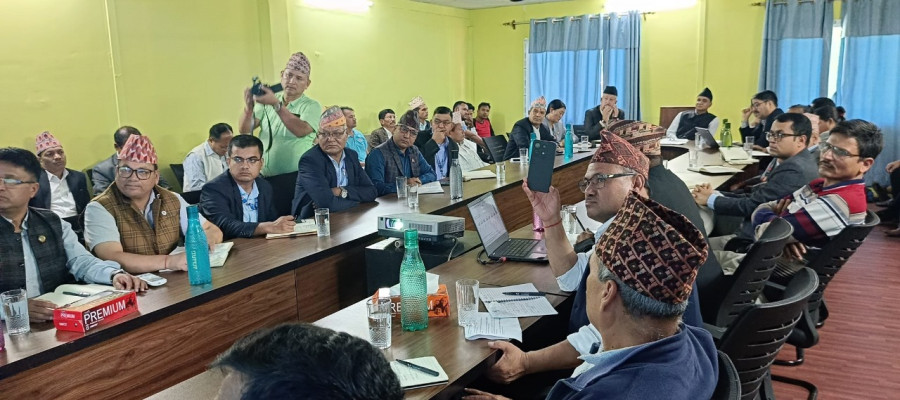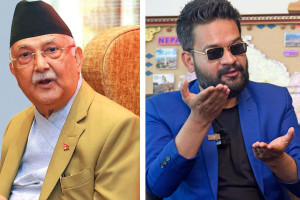Columns
Empowering provinces
Though evolving, federalism in Nepal can potentially transform governance and development.
Khim Lal Devkota
Following up on my previous piece on "Chief ministers' insights on federalism", this article explores the views of Lumbini, Karnali, and Sudurpashchim provinces.
At a programme in Lumbini, Chief Minister Chet Narayan Acharya highlighted a major concern: The 26 percent reduction in the fiscal equalisation grant. Despite repeated requests, the federal government has not adequately addressed this issue, causing significant financial strain on the province. The constitutional right of provinces to fiscal transfers has been compromised, particularly due to delays and reductions in equalisation grants and the haphazard allocation of conditional grants.
Since the implementation of federalism, Lumbini has seen considerable development. Acharya emphasised that while the federal government should devolve constitutional powers to the provinces, the provinces must also allow local governments to independently carry out their functions.
However, despite these constitutional rights, some problems persist. For instance, the federal government retains the authority to initiate legal actions against civil servants, even though these officials are expected to serve under provincial and local jurisdictions. This creates friction between different levels of government. Additionally, the federal government has not allowed the provinces to manage the police security force.
The chief minister highlighted Lumbini's development achievements, noting that the province has nearly doubled its road network from 11,000 to 22,000 kilometres, proving it a key contributor to national progress. Lumbini's focus on capital expenditure contrasts with the increasing current expenditures at the federal and local levels.
In Karnali, Chief Minister Yam Lal Kandel acknowledged the difficulties of federal governance but pointed to the significant progress made over the past seven years. He emphasised that party-based politics heavily influences institutional actions, yet Karnali has shown tangible advancements. Kandel stressed that the time has come to focus on policy implementation rather than public opinion. Learning from past experiences and addressing problems head-on should be the priority.
Kandel voiced concerns about centralised thinking persisting even within a federal system. He urged caution in rushing constitutional amendments that might create chaos. Fiscal distribution to the provincial government remains imbalanced, requiring adjustments to ensure fairness and equity.
Governance problems, including officials' reluctance to serve in remote areas and political interference in administrative matters, further complicate the implementation of federalism. Despite these challenges, Kandel firmly believes that strengthening the federal governance system through meaningful reforms and transparent governance is essential.
Sudurpashchim’s Chief Minister, Kamal Bahadur Shah, reflected on both his province's progress and challenges. He mentioned a 17-point proposal the province submitted last year to the National Coordination Council meeting, outlining key issues, such as fiscal distribution and project selection imbalances, requiring federal leadership’s attention.
A notable achievement for Sudurpashchim has been the passage of the Civil Service Law, though inconsistencies between federal and provincial interpretations remain. For example, the federal government insists on appointing 12th-grade level officials as provincial secretaries, while the province prefers 11th-level officials. These discrepancies hinder the smooth implementation of federalism.
Chief Minister Shah emphasised the need to address core issues like fiscal distribution and project selection, which are crucial for making federalism work for people. While Sudurpashchim has made significant strides, Shah remains optimistic. He believes that with continued dialogue and collaboration, the province can overcome remaining challenges and ensure that federalism not only survives but thrives in Nepal.
The interaction programmes conducted by the Federalism & Localisation Centre also included other vital participants such as ministers, speakers, deputy speakers, provincial assembly members, local government chiefs and deputy chiefs, political party leaders, civil servants and civil society members.
They reviewed the successes and challenges of the federal governance system, including provincial governments. They emphasised that while preserving the achievements gained through long struggles and sacrifices, the government must build trust in the federal system. This should be accompanied by reforms that ensure justice, equality, good governance and sustainable development. Although there are many questions about the federal government system, stakeholders from all seven provinces have stressed the need to strengthen the system through necessary improvements.
There are growing concerns among citizens regarding the federal governance system, particularly the provinces. Political parties do not seem serious about the implementation of federalism. Provinces have been deprived of the constitutional rights granted to them. They lack the authority to exercise control over the police and do not have administrative control over their own staff. Chief ministers are unable to fully exercise their power and must seek approval from central leaders even for small decisions. The provincial structures of political parties are also not aligned with the federal system, as central leaders do not allow provincial party committees to exercise their authority.
Local governments in Nepal have been well-organised and effective in exerting pressure on the federal and provincial governments. A notable example occurred when the federal government reduced the fiscal equalisation grant by 26 percent for both provinces and local levels. Local government associations strongly opposed this decision and applied significant pressure, which led to the reinstatement of the grant at the local level. However, the federal government did not release the funds to the provinces, and the provincial grant for FY 2024-25 has decreased compared to FY 2018-19 despite a 550 billion rupee increase in the federal budget.
Additionally, several bills infringing on provincial and local governments’ rights have been introduced in the federal parliament. During my tenure as a Member of Parliament, I opposed many of these bills, which aimed to infringe on the rights of the provinces and local levels through legislation. This ongoing centralisation threatens the federal system and undermines the authority of subnational governments.
Lobbying within the federal parliament and among political parties is essential to protecting provincial and local rights and promoting the successful practices of subnational governments. However, provincial leaders have struggled to effectively organise themselves against federal overreach because they fear antagonising central leadership.
In response to these challenges, I coordinated the establishment of the Federalism & Localisation Centre, a think tank created just over a month ago in consultation with the provinces and political party leaders, particularly those who are sincere and committed to federalism and subnational governments.
The think tank conducts research and legislative activities (including post-legislative scrutiny) and fosters intergovernmental relations by coordinating efforts with federal units. The centre brings together representatives from all major political parties in Nepal and experts from various disciplines, aiming to strengthen federalism, democracy and inclusion in the country.
Again, reflecting on the interaction programmes: From Koshi's advocacy for equitable resource sharing to Madhesh's call for stronger political commitment to federalism, Bagmati's concerns over police integration, Gandaki’s push for land acquisition, Lumbini’s focus on infrastructure growth, Karnali’s commitment to transparent governance and Sudurpashchim’s emphasis on civil service reforms—each province has demonstrated a solid commitment to making federalism work. The provinces stress the need for consistent action from the federal government and leadership from political parties to truly institutionalise the federal system.
The path forward lies in meaningful reforms, clearer constitutional guidelines and greater cooperation between all levels of government. By addressing these challenges, empowering provinces and delivering tangible benefits to its citizens, Nepal can strengthen its federal system. Federalism in Nepal is still evolving, but with sustained effort, it has the potential to transform governance and development across the country.




 10.12°C Kathmandu
10.12°C Kathmandu















